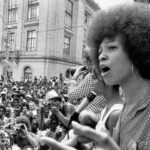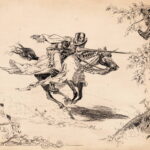ENGL1080: Literature Core: Prisoners and Visionaries
In fall 2018, I taught this version of Literature Core for the first time. It grew out of a unit in ENGL2170: Introduction to British Literature and Culture I, a survey course, in which I grouped fifteenth-century writers under the rubric of “visionaries and prisoners.” My section of Literature Core triangulates between the U.S. prison system, Black socialist thought, and Michel Foucault’s Discipline and Punish.
As part of the English Department’s EnCore pilot program, my section was linked with Chris Boucher‘s Literature Core: Literature of the Fantastic. The sections had separate enrollments and met separately but read Shakespeare’s The Tempest and Kurt Vonnegut’s Slaughterhouse-Five concurrently and met together four evenings during the semester for reflection sessions and special events on campus.
While the United States makes up 4% of the world’s population, it imprisons 22% of the world’s prisoners. This course takes the prison system as a starting point for investigating literary imagination. Many celebrated writers (Margery Kempe; Queen Elizabeth I; Ezra Pound; Martin Luther King, Jr.) were both prisoners and visionaries. Others (Shakespeare, Octavia Butler) envision the world differently through visions of imprisonment. We will be guided by Michel Foucault’s foundational analysis of the modern prison in Discipline and Punish.
from the course description
units
Why the prison?
Before the prison
The body in question
Prisons of the mind
Envisioning culture
“Delinquents”
The carceral imagination
ENGL4925: Advanced Topic Seminar: Literary Approaches to the Past
In fall 2013, Ian Cornelius and I co-taught this advanced elective at Yale University as ENGL179 under the Associates in Teaching program. The experience of collaborative teaching was immensely fulfilling and (for me, a graduate trainee at the time) instructive; I would look forward to doing it again. I then taught a solo version as a special “Advanced Topic Seminar” in spring 2015, my first year at Boston College.
The course connects with research questions I was then exploring for my first book, and which continue to drive my scholarship. How does literature shape time? How do literary texts imagine temporality? How do boundaries between periods and disciplines reveal or occlude the time of the text and the time in the text? What is the genealogy and legitimacy (if any) of medieval?
This course is a study of literary narratives set in the distant past, spanning 500 years of literary history. Questions to be addressed include: Of what use is the past to the present? Is anachronism always an error? Does the meaning of the past change over time? We consider why an array of writers, including Thomas Malory, William Shakespeare, and Mark Twain, chose to tell tales of long ago. Some course readings in Middle English; no prior knowledge of Middle English required.
from the course description
units
Why the past?
Heroes and strangers: Arthurian romance
Saints and pagans: Christian romance
History, chronicle, tragedy: The birth of medievalism?
Romantic medievalism and its discontents


